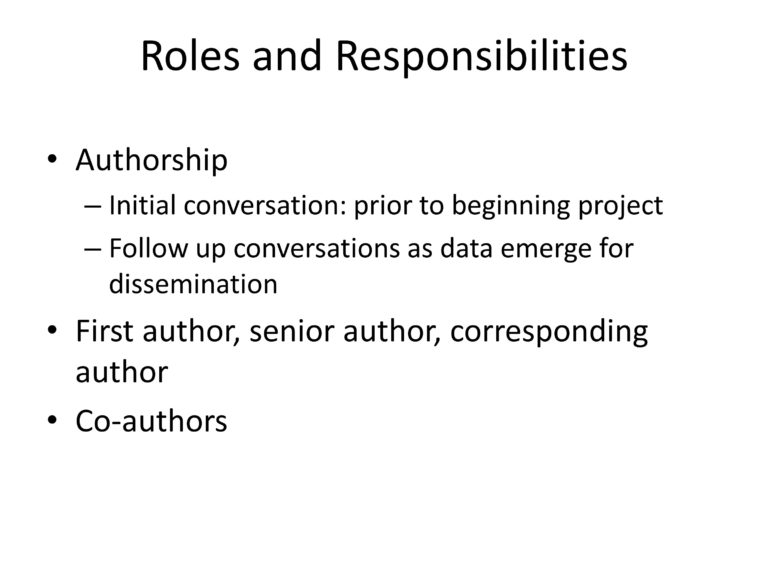Successful collaborations require clear and frequent communication about expectations, responsibilities, timelines, and authorship
The following is a transcript of the presentation video, edited for clarity.

I’ve been in both really successful collaborations and ones that have not been quite so successful.
Who will do what?
What’s really important is to decide — and probably a lot of you in this room already know this — is who is going to do what. What are your responsibilities in those roles?
Often, at least in my collaborations, there have been different types of expertise. But there’s collaborations where we have had overlapping expertise, and sometimes the bulk of the work can end up falling on one person.
It’s one thing to put something on paper and write a big grant and say, “Oh, we’re going to investigate the following. We’re going to do X, Y, and Z.” You have to come up with the experimental design and some of these details to actually write a grant proposal. But then — who is actually going to do that? Generally when you write a grant, some of the experimental work has already been done. Or you have some of your paradigms. You have your equipment set up.
But sometimes you don’t. I think it’s really important to know who is going to do these kinds of things. Who is going to develop the experimental design? Are we going to do that together? Who is going to put this equipment in place? Is it going to be the PI in the PI’s lab? It gets kind of complicated when you have several investigators and they all have people on their part. Especially in a subcontract situation. Who is going to do that? Are we going to do that at your shop or at mine?
Those are things to really talk about — and early on. Getting the ideas on paper is just one of many, many things that have to be done. And I think it’s important to discuss that.
As it says on the slide—determine the expectations, sometimes before you enter into the collaboration.
But saying that, being flexible is very important.
Just yesterday, I got an email from a new assistant professor in neurosurgery and he wants to do rTMS. It turns out the people in my lab already went to visit him. So, he emailed me and said, “I met with people in your lab, and I’m really excited about meeting with you and doing some collaboration and all this kind of stuff.” I wrote back, “Thank you for getting in touch with me. I’m going to be out of town this week, I’ll be back next week and maybe … what’s good for your schedule.” And he said, “Oh, Monday or Tuesday would work, but I’m flexible.” So that, to me says something. So he’s really going to adjust his schedule so it will fit with mine at this point. So then, you have to both maintain flexibility.
Before I have that conversation with him, I’m going to have in mind what I want. He probably is going to have in mind what he wants. But we both will have to work together to figure out what’s going to work. I think that’s important.
Timelines
The timeline is really important. Not only in developing the grant proposal, but also in carrying out all the work, to have the timelines really down pat.
We’re all really, really busy and it’s easy to let something slide unless you have a timeframe that you have committed to meeting for all of these things. So when are we going to do this, when are we going to do that? And always having someone checking up on that. Who is going to do that? Who is going to make sure the timelines are met? Usually that falls to the PI. But sometimes PIs don’t do that. I’ve been on a grant where I’m not the PI, and the PI is not doing these things in a timely manner. And it’s easy for me to say, “Oh, good. He forgot about that. I have another week to do something else.”
We also have periodic meetings. We have lab meetings every week. We have Center meetings once a month. We have lots of stuff going on. Then the summaries, and discussions, and action steps. “Here’s where we are, but what are we going to do next?”
Authorship

Authorship. This has already been mentioned a little bit, but this is a tough one. I’m sure you’ve all had this kind of situation. Even with your students. Or if you are a student, with your mentor. These are the kinds of conversations that really need to take place very early. And I recommend before beginning a project. Then follow up conversations as the data emerge.
Now first author and senior author. You know, I always thought first author was the best place to be. I have collaborators in the medical school, and their whole thing is senior author. I’ll never forget when we had a postdoc who was in one of my projects and she said, “Oh this is my first senior author!” And I’m going, “Why are you so happy that you’re going to be the last author?” But I’m almost always last author — our field does that too. So I’m clearly always last author on my students’ work, but also even on grant project. It can get kind of hairy as far as who is going to be first author. If it’s a summary paper, or something that’s a really crucial thing I have my heart on, I will be first author. But most of the time I take the senior/last author position.
Also, who is going to be an author? So the medical model is to have like 18 authors, or 25. I tend to be pretty open, and it’s fine with me. People need to build their careers and so they should be on papers. But other people feel differently than I do.
Questions and Discussion
Audience Comments, Identifying Role and Percent Contribution on Papers:
- One thing about authorship that I think is very important at many universities is to have a clear identification of the role each person played, irrespective of the position — whether first or senior. This is very important because when you go up for tenure or promotion, some universities will ask for each of your papers what role you played, maybe even including percentage contribution. It’s a really good thing to work that out with your coauthors so any claim you make is one that other people will support. So if you claim, “I did everything” other people may not feel that’s the case. Even if that’s not true where you are now, be aware that if you move, you might go to another university where they do have that expectation that you can indicate the exact role you played on each publication. That’s a really important thing to do, and it’s becoming more and more common.
- Just to quickly follow up — you’re starting to see journals ask you to specify. You’ll see, “SD did nothing but read the proof. MD did all the work.” Things like that. It’s becoming very explicit.
Audience Comments, Data Management Across Sites:
- One of the things that’s kind of interesting about these multi-site projects is also making data sets available to your doctoral students or postdocs, and how you do that, and how it affects authorship, and things like that as well.
- That’s huge. In fact we are just now having the discussion in my own lab. All the PIs and people at each of the sites who the PI wants to have, have access to the data files. But we really had a bit of a not-so-great experience with one student who was in the lab for a very short time. Now we only give access to the server to certain key people who have to be in the lab, and so on. Because someone could come in and essentially destroy all your data. Which is not a good thing.
- The more data you have, the more people you have, the more sites you have, the more complicated it becomes. It really is. All this management stuff, it is like running a business. Somebody said the first day of this conference, it’s like running a small business. It really is. You have the employees, you have the people, you have to manage the money, you have to secure all of whatever it is that you’re making — those are the data — and make sure only the right people get them.
Audience Comments, Pressure to Enter an Unequal Collaboration:
- What would you suggest to young investigators in terms of collaborations when somebody says, “I’ll help you with recruitment of the subjects, I’ll help you with the study, but I need to be first author on all the papers.” Or something like that. That’s a little extreme. But I’ve heard the words come out of people’s mouths, and it’s easy for me to handle something like that: “See you later, we don’t really need you.” But what would a young investigator do to handle that.
- I’ve not been in that situation, nor have I been in a situation where I felt pressured or desperate to enter into that kind of relationship. But I wouldn’t go there. Because in addition to that being an inappropriate relationship for the distribution of duties, that attitude tells me a great deal about how the rest of this relationship is going to go. And that I’m going to have no or little say, I’m not valued, and it will get worse from there, I expect. I would say, “No, thank you.”
- It’s not very far removed — I’m still a young investigator so I can relate to this. That project just moved to the back burner for me, if I can afford to move it to the back burner, to buy me some time. If I can’t afford for it to go to the back burner, I need to find a strategy where I don’t need that kind of subjects any more, or suddenly my research plan has changed substantially enough that I’m going a different route. Especially if that person is in a position of power within my institution or within my subfield who will be reviewing grants and so forth.